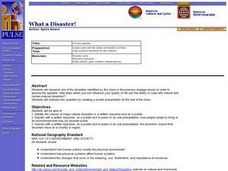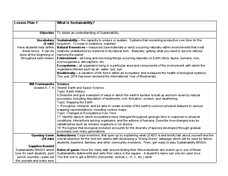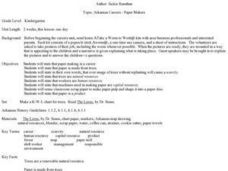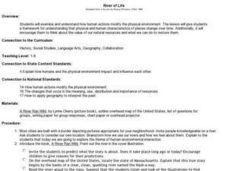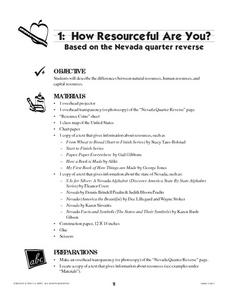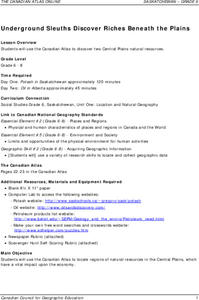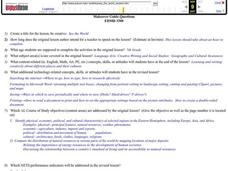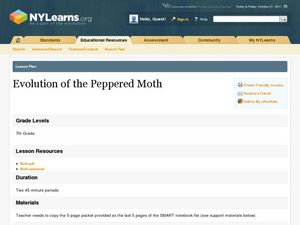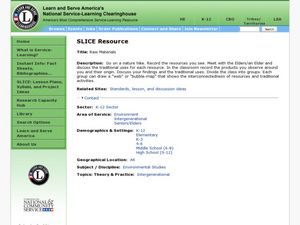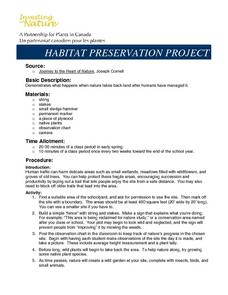University of Georgia
Antacid and Uncle Heartburn
Household materials can be used for more than cleaning! In this collaborative experiment, emerging chemists use products such as vinegar and liquid antacid to explore chemical reactions that commonly occur in the human body.
Cold Spring Harbor Laboratory
Some Types of Mutations Are Automatically Repaired
Does natural light damage or repair DNA? Learn the answer discover the scientists who researched the topic with an online interactive. Scholars read through an online animation presenting the content at their own pace. Then, they read...
Discovery Education
The Time of Our Life
Mammals are some of the newest organisms to appear on Earth. Young scholars complete an activity that results in a timeline showing the appearance of different types of living organisms. Provided with a list that spans from prokaryotes...
American Museum of Natural History
All About Cloning
Start seeing double. The American Museum of Natural History website provides pupils with information about Dolly, the cloned sheep. Learners find out the procedure used to create Dolly along with why scientists clone animals.
Curated OER
We are all Responsible
Students desribe the interdependence between humans and nature and positive behavior with regards to natural resources. They demonstrate respectful attitudes and behaviors with regards to the environment. Students gain knowledge of...
Curated OER
What a Disaster!
Pupils identify the causes of major natural disasters in a written response and on a poster. They explain with a written response, on a poster and to peers in an oral presentation, how people adapt to living in an environment that may be...
Curated OER
What Is Sustainability
Students investigate the concept of how people are dependent upon natural resources and how they can apply them to be maximized in usefulness. The students are encouraged to develop an appreciation for the environment. They conduct a...
Curated OER
Arkansas Careers - Paper Makers
Students listen to the story The Lorax. They identify natural, human and capital resources in the book. They identify the scarcity problem and brainstorm solutions. Students view a map of Arkansas which shows natural resources. They...
Curated OER
Environment: River of Life
Students assess the impact of human activity on the environment. After reading the book, "A River Ran Wild," they role-play and discuss how people changed the river. Students write stories about living along a river from the point of...
Curated OER
How Resourceful Are You?
Students examine the Nevada state quarter and discuss items on the quarter, categorizing them as natural resources, human resources, or capital resources. They paste other coins into correct categories depending on the resources depicted...
Curated OER
Underground Sleuths Discover Riches Beneath the Plains
Students identify Alberta, Saskatchewan, and Manitoba on map, and use Canadian Atlas to locate regions of natural resources in Central Plains, which have vital impact upon the economy. Students then complete scavenger hunt worksheet.
Curated OER
See the World
Seventh graders locate and write creatively about different places and their cultures. They identify the physical, economic, social, political and cultural characteristics of selected regions in the Eastern Hemisphere. Finally, 7th...
Curated OER
Evolution of the Peppered Moth
Seventh graders complete a timeline about the evolution of the peppered moth. In this biology lesson, 7th graders write an essay about how human can affect evolution. They share their essay with the class.
Curated OER
Buffalo Gone: Appreciating Natural Resources
Students develop numercy skills by studying the number of bison before and after the arrival of European settlers in Canada. They examine the affect of the reduction in the number of bison on Native families.
Curated OER
If You Mess With A Wetland, At Least Try to Make Amends!
Eighth graders examine the role of wetlands in an ecosystem. In groups, they use the internet to research how humans have disturbed and ruined the effectiveness of wetlands throughout the country. They pretend they are in charge of...
Curated OER
Raw Materials
Students participate in a nature hike and record the natural resources observed. They compare traditional and modern versions of everyday use items, and create graphic organizers that demonstrate the interconnectedness of resources.
Curated OER
Simple Everyday Products
Fourth graders investigate the origin of products and how they are manufactured from natural resources. They draw the production cycle and discuss how one could help reduce the number of natural resources that are used. They also...
Curated OER
Making Connections, Linking Population and the Environment
Learners find out that all habitats have a carrying capacity. They explore how the world's human population has grown markedly in the 20th century, and that humans impact environmental health. Students investigate that people can and...
Curated OER
Models of Succession
Students create a model city in order to understand the effects human habitats have on the environment. In this environment lesson, students examine the effects human habitats have on the environment. Students create a model city and...
Curated OER
Mother Earth
Students compare natural and human made items and gain an awareness of the importance of Mother Earth to the Nez Perce people.
Curated OER
Habitat Preservation Project
High schoolers demonstrate what happens when nature takes back land after humans have managed it. They find an area in the schoolyard, and mark it off with a boundary. Students build a simple fence with string and stakes. They put up...
Curated OER
Fertilizers, Pesticides and Health
High schoolers apply real data to create and calculate algebraic equations. Students create a visual to represent the concentration for one part per million and apply unit analysis to verify measurement computations. High schoolers...
Curated OER
Tracking Current "Earth" Events
Eighth graders utilize Internet research skills, and practice their communication skills by presenting their research to the clas. They actively consider the types of hazards for humans associated with Natural Disaters and ways that...
Curated OER
Introduction to Waste Management
Students research the difference between hazardous waste and municipal solid waste. Different companies in their community are researched to determine which are contributing waste in their region, what type of waste is generated, the...
Other popular searches
- Philosophy of Human Nature
- Democracy and Human Nature
- Essays on Human Nature
- Human Nature Hobbes
- Human Nature Good
- Enlightenment Human Nature
- Human Nature in Plays
- Human Nature Environmental
- Poetry on Human Nature
- Aristotle Human Nature
- Human Nature Enviromental







